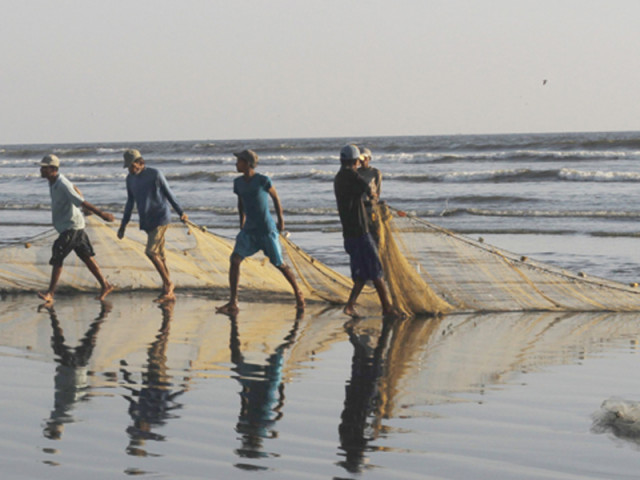Going extinct: Illegal fishing practices ruining livelihood of Sindh’s fishermen
Participants at workshop stressed need for legislation, finding alternative means of income

Going extinct: Illegal fishing practices ruining livelihood of Sindh’s fishermen
While speaking at a workshop on 'Poverty Alleviation and Environmental Conservation' held by 11 partner organisations of the United Nations Development Programme's Global Environment Fund (UNDP-GEF) at Badin Gymkhana, he urged local communities to look after their own affairs.

"Fishermen in Balochistan don't allow anyone to use illegal fishing nets," Shoro pointed out, saying that the practice of catching trash fish (low-value fish) in surfeit had limited the means of livelihood of Sindh's fishermen. "We have almost completely lost some rare species of fish," he lamented, adding that the provincial government was ready to introduce strict laws through the Sindh Assembly.
It is not only the illegal fishing practices that have adversely affected Badin's communities. Odd weather patterns are also playing their part. "We will run short of firewood in the next five years," UNDP-GEF country coordinator Masood Ahmed Lohar informed the workshop. "It will only be available at the same rates as gold."
Lohar emphasised the need to find alternative means of livelihood for those who are dependent on fishing, highlighting the social impact of catching trash fish on the communities. "They will move upstream, and the migration will lead to an increase in crime," he predicted, asking for help from the government on the policymaking level as he discussed the problems that would arise if prompt action wasn't taken. "It is a state of emergency."
Sindh law, parliamentary affairs and environment minister Dr Sikandar Ali Mandhro said that the provincial government would introduce new laws. "Yes, the government is responsible, but the communities are the real partners in terms of implementation," he asserted. "Food insecurity does exist in this region and it is not only the government but also civil society that must step forward to eradicate the menace of poverty."
Meanwhile, Mandhar Development Society (MDS) president Abbas Khaskheli said that the provincial government had imposed a ban on trash fishing after their recent efforts. "The law already existed in the form of the Fisheries Act 1980, but it was not being implemented because of the powerful hands behind the trash fishing mafia," he explained. "We are trying our best to preserve the indigenous fish species, but it is not an easy task."
The practice of trash fishing is both rendering such species extinct and augmenting poverty in the coastal belt. "We had not known about the severity of the problem and had no clue that it was directly affecting our own source of income," Muhammad Urs, a participant at the workshop, told The Express Tribune. "Many species of fish have nearly disappeared from the area, and I believe that this is because of trash fishing, which has been happening here for many years."
Sindh Assembly lawmakers Mir Allah Bux Talpur, Bashir Ahmed Halepoto, Muhammad Nawaz Chandio and Dr Sikandar Shoro also attended the event, along with scores of women from Sindh's coastal belt areas.
Published in The Express Tribune, October 6th, 2014.


















COMMENTS
Comments are moderated and generally will be posted if they are on-topic and not abusive.
For more information, please see our Comments FAQ